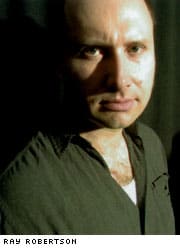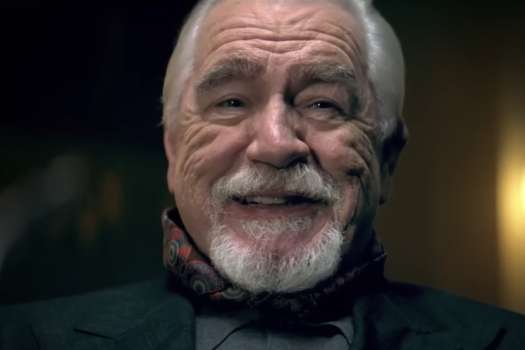Even the most die-hard alt-country fan has probably seen the name Gram Parsons referenced in music rags enough for one lifetime. But of course, there's a reason for that. Gram was more than just a spoiled Southern brat who hit upon the idea of mixing country and rock'n'roll; he was a visionary who saw this notion bringing about a wholesale change in America's cultural climate, where breaking musical barriers equalled breaking racial and generational barriers. Dying a visionary's death just as his Cosmic American Music was being bastardised in the mainstream by the Eagles only ingrained Parsons' place in the canon of great misunderstood American geniuses.
His story remains powerful stuff, powerful enough to inspire Toronto novelist Ray Robertson's third book, Moody Food (Doubleday). Here, Parsons becomes Thomas Graham, a privileged child who finds the music of his Southern upbringing as a means to escape a gentrified society he doesn't fit into. The book begins in swinging 60s Toronto where Thomas has landed as a draft dodger. There, he chances upon Bill Hansen, the story's narrator, who also happens to be searching for a way out of his boring life of academia, and into the Yorkville hippie scene that constantly tempts him. By subsequently having Thomas persuade Bill to put aside his Dylan records, immerse himself in country music, and be part of a band that will bring to life Thomas's "Interstellar North American Music," Robertson successfully reaches the heart of the Gram Parsons myth, which is not so much the power of his music, but the power of his personality. Using the Parsons myth as a skeleton, Robertson goes on to explore themes of loyalty, both to the muse and one's friends, throughout the rest of the novel.
"In fiction, you can shape conflict and contradictions, so I really liked the idea of this guy, Thomas Graham, just showing up in Yorkville like a Messianic figure and cleaning house," Robertson says. "It worked factually making him a draft dodger but it's like the line I put at the end of the book, This is a work of fiction, and therefore of truth.' If I can make you feel what I think Gram was really like by lying to you, then great. It's like in the 80s when I'd try to turn people on to Gram's music by telling his story; I'd go at it from different angles, because I knew certain aspects would give them goose bumps. You kind of have to lie to get at the metaphysical truth."
Fans of Parsons will undoubtedly be impressed by the countless references Robertson manages to slip into the narration, as well as those to other luminaries of the time, such as Neil Young, Brian Wilson and Jim Morrison. And although he has never had musical aspirations himself, Robertson seems to have a good grasp of inter-band politics, which he displays during the novel's second half when Thomas and Bill's band, the Duckhead Secret Society, heads to L.A. to record their first album. Perhaps not coincidentally, his first novel, Home Movies, also had a musician as a central character. "I believe that no matter what artistic pursuits you have, you want to be regarded like a rock star," Robertson says. "Especially novelists and poets. I remember reading an old interview with Leonard Cohen where he said that the days of poets standing on windswept cliffs wearing capes are over. Nowadays they play guitars. I agree with that to a certain degree, mainly because of the energy and vitality that it brought to writing in general. Writers have to accept the fact that we're in an age when writers don't matter anymore. I look at the positive side, which is you can do whatever you want to do.
"The obvious draw of writing about the time Gram lived in is it was a time when music was really the thing that mattered. And as far as country music goes, I just love the integrity in the same way someone might love the integrity of Richard Hell or the Sex Pistols. More and more people are coming to terms with the fact that Hank Williams was the first punk rocker."
If Robertson doesn't sound like a typical Canadian novelist, it's because he isn't. He is an outspoken critic of many of our literary icons, including Margaret Atwood and Alice Munro, ironically because of the cult of personality that has arisen around them. "I like to think that there's rock and roll in my sentences, and I don't get that sense from a lot of Canadian literature. Novelists have to be envious of the kind of power that music and movies have on people. At the same time, I still haven't found an art form that can do what a novel can. You only have to watch movies based on rich books to see that that's true. "But writers ultimately can't decide what they write about. I'm not expecting this book to be embraced by the general Canadian book-buying audience, mostly because it's not set in a small town in Newfoundland. That's not going to stop me from writing about things that mean a lot to me."
His story remains powerful stuff, powerful enough to inspire Toronto novelist Ray Robertson's third book, Moody Food (Doubleday). Here, Parsons becomes Thomas Graham, a privileged child who finds the music of his Southern upbringing as a means to escape a gentrified society he doesn't fit into. The book begins in swinging 60s Toronto where Thomas has landed as a draft dodger. There, he chances upon Bill Hansen, the story's narrator, who also happens to be searching for a way out of his boring life of academia, and into the Yorkville hippie scene that constantly tempts him. By subsequently having Thomas persuade Bill to put aside his Dylan records, immerse himself in country music, and be part of a band that will bring to life Thomas's "Interstellar North American Music," Robertson successfully reaches the heart of the Gram Parsons myth, which is not so much the power of his music, but the power of his personality. Using the Parsons myth as a skeleton, Robertson goes on to explore themes of loyalty, both to the muse and one's friends, throughout the rest of the novel.
"In fiction, you can shape conflict and contradictions, so I really liked the idea of this guy, Thomas Graham, just showing up in Yorkville like a Messianic figure and cleaning house," Robertson says. "It worked factually making him a draft dodger but it's like the line I put at the end of the book, This is a work of fiction, and therefore of truth.' If I can make you feel what I think Gram was really like by lying to you, then great. It's like in the 80s when I'd try to turn people on to Gram's music by telling his story; I'd go at it from different angles, because I knew certain aspects would give them goose bumps. You kind of have to lie to get at the metaphysical truth."
Fans of Parsons will undoubtedly be impressed by the countless references Robertson manages to slip into the narration, as well as those to other luminaries of the time, such as Neil Young, Brian Wilson and Jim Morrison. And although he has never had musical aspirations himself, Robertson seems to have a good grasp of inter-band politics, which he displays during the novel's second half when Thomas and Bill's band, the Duckhead Secret Society, heads to L.A. to record their first album. Perhaps not coincidentally, his first novel, Home Movies, also had a musician as a central character. "I believe that no matter what artistic pursuits you have, you want to be regarded like a rock star," Robertson says. "Especially novelists and poets. I remember reading an old interview with Leonard Cohen where he said that the days of poets standing on windswept cliffs wearing capes are over. Nowadays they play guitars. I agree with that to a certain degree, mainly because of the energy and vitality that it brought to writing in general. Writers have to accept the fact that we're in an age when writers don't matter anymore. I look at the positive side, which is you can do whatever you want to do.
"The obvious draw of writing about the time Gram lived in is it was a time when music was really the thing that mattered. And as far as country music goes, I just love the integrity in the same way someone might love the integrity of Richard Hell or the Sex Pistols. More and more people are coming to terms with the fact that Hank Williams was the first punk rocker."
If Robertson doesn't sound like a typical Canadian novelist, it's because he isn't. He is an outspoken critic of many of our literary icons, including Margaret Atwood and Alice Munro, ironically because of the cult of personality that has arisen around them. "I like to think that there's rock and roll in my sentences, and I don't get that sense from a lot of Canadian literature. Novelists have to be envious of the kind of power that music and movies have on people. At the same time, I still haven't found an art form that can do what a novel can. You only have to watch movies based on rich books to see that that's true. "But writers ultimately can't decide what they write about. I'm not expecting this book to be embraced by the general Canadian book-buying audience, mostly because it's not set in a small town in Newfoundland. That's not going to stop me from writing about things that mean a lot to me."




